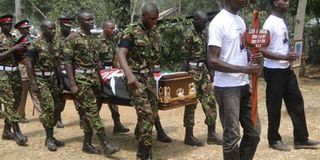Soldiers seek better terms for troops in war against Shabaab

Kenya Defence Forces soldiers (KDF) carry the casket of their comrade Eliakim Omenda, who was killed in an Al-Shabaab attack in El Adde, Somalia. KDF soldiers were were understood to have pulled back after threats from Al-Shabaab, shortly after the tragedy in El-Adde, where a base was overrun by Al-Shabaab and Kenyan troops killed. PHOTO | NELCON ODHIAMBO | NATION MEDIA GROUP
What you need to know:
- The soldiers, some deployed almost permanently to keep Al-Shabaab out of Kenya, are paid only Sh20 as hardship allowance a day and Sh40 for married ones.
- Some of the soldiers said that although they were winning the shooting battles, they were losing the war to Al-Shabaab because there is no clear strategy.
- The soldiers appear to regard with bitter resignation what they say is blatant corruption in some sections of the top echelons of the military.
Soldiers in elite units of the Kenyan military battling Al-Shabaab have complained about poor pay and lack of compensation for injuries at war.
Putting their careers on the line to air their grievances, the soldiers challenge the “Amisom terms and conditions” and question what they see as bad leadership and corruption among top commanders.
The soldiers, some deployed almost permanently to keep Al-Shabaab out of Kenya, are paid only Sh20 as hardship allowance a day and Sh40 for married ones.
With their hands tied by military discipline, some of the soldiers have been contemplating leaving the forces altogether — despite years of service and hard training — so that they can fight the problems in the service from outside.
Contacted for a comment on issues raised by the soldiers, military authorities asked for more time to study the questions and promised to answer them.
The Nation will publish their response once it is ready.
Soldiers who have spoken to the Nation sounded surprisingly disillusioned by what they saw as command failure and “mission confusion” in Somalia.
“Kenyan soldiers are not cowards. They are well-trained and capable but they are let down by poor strategy,” said one from the Special Operations Regiment who said he has been in almost constant deployment against Al-Shabaab since Kenya went into Somalia in 2010.
Some of the soldiers said that although they were winning the shooting battles, they were losing the war to Al-Shabaab because there is no clear strategy.
The soldiers are particularly bitter about the fact that no effort is being made to reconstruct communities in the territory they fought so hard to liberate so as to lock out Al-Shabaab and prevent radicalisation.
They are also aghast at some of the decisions being taken, such as the retreat from Badade to Kolbyo, given how hard they had battled to take the area. “We are wasting time. Our soldiers are dying for nothing,” he said.
The KDF are understood to have pulled back after threats from Al-Shabaab, shortly after the tragedy in El-Adde, where a base was overrun by the militants and Kenyan troops killed.
The soldiers appear to regard with bitter resignation what they say is blatant corruption in some sections of the top echelons of the military.
One soldier said every time they board their helicopter to respond to an Al-Shabaab alert, they are thinking: “We are helping people build skyscrapers in Nairobi.”
INCREASED GRAFT
According to the troops, graft in the forces is blatant. “Taxpayers pay for cooking gas for us but we use firewood,” the soldier said. “Everyone is cashing in.”
A worrying example is Kenya’s ally in the war, Ahmed Madobe, who the soldiers said has recently built himself a palace but has done little to improve the lives of ordinary Somalis.
As a result, young people are choosing to join Al-Shabaab rather than his militia.
“Al-Shabaab is giving guns to children as young as 10 and 12. These are the most dangerous because what do you do with them?” he asked, referring to the fact that they can’t engage children, even if they are armed.
The soldiers are equally dismayed by neglect of border communities by both county and national governments, especially between Kiunga and Mpeketoni in Lamu, where they say children are not going to school mainly because there are no teachers.
“There is no education. In one school, which used to have 300 children, now there are 100 being taught by a single teacher from the community,” he said.
Soldiers are particularly frustrated because their seniors are unable to take their complaints up the chain of command. If a commanding officer complains about the poor treatment of his men, “a plane comes the following day and he is recalled to HQ to deal with paperwork”.
The Kenyan public and the world outside have no idea that the country’s special forces in Somalia and Boni Forest in Lamu have been doing a marvellous job containing the extremists.




